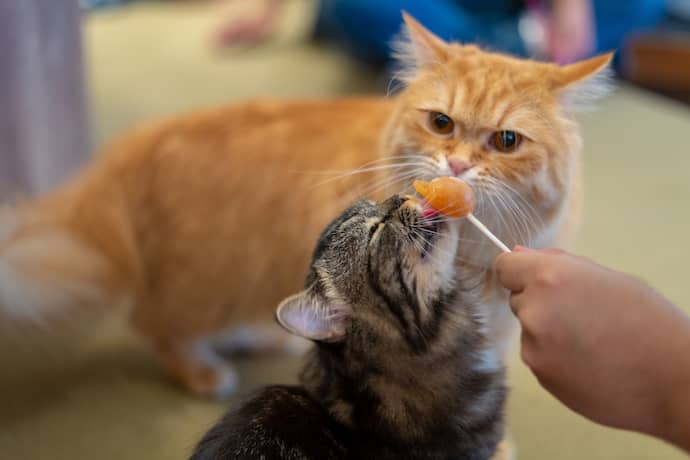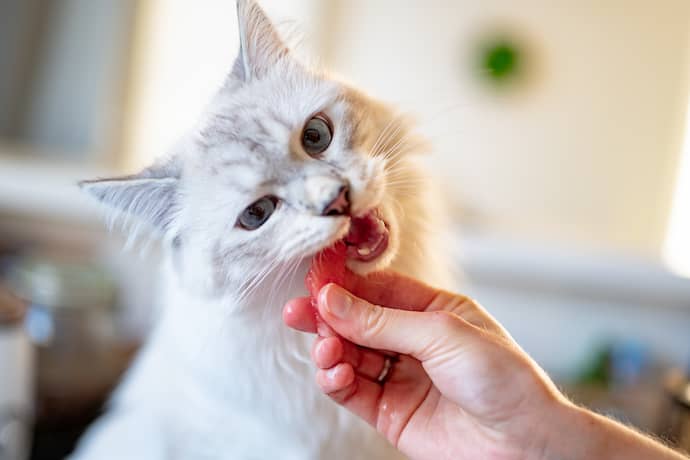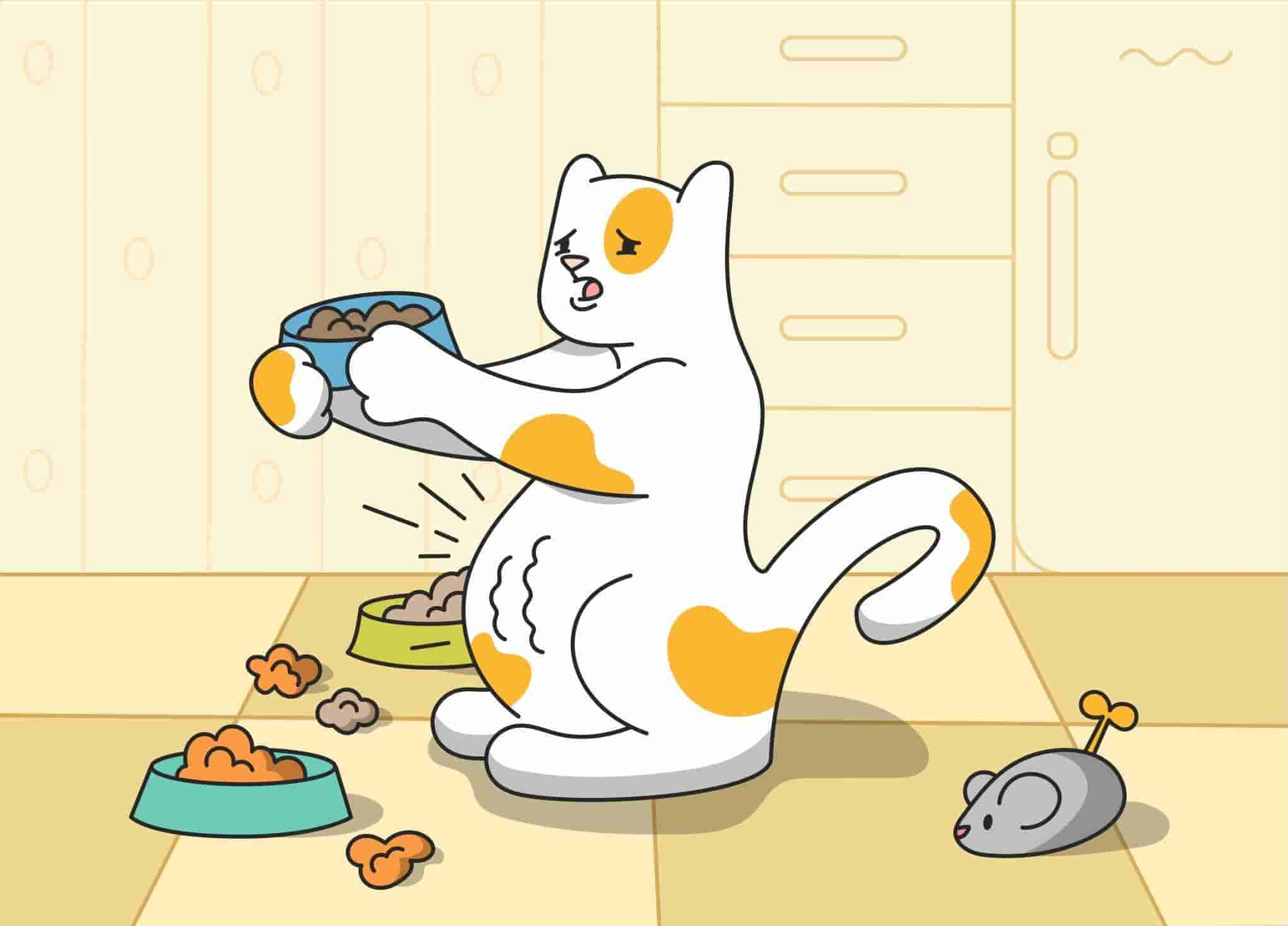When your cat suddenly loses their appetite and doesn't want to eat the whole day, it's a clear manifestation that something went wrong and that a visit to the vet may be necessary. But on the other end, what if your cat is always hungry? It's easy to think that a good appetite is a positive sign, but if your cat is always hungry, it might also indicate that they have a health issue that needs to be addressed.
Stop Googling - Ask a Real Vet
Possible Reasons Why Your Cat Is Always Hungry
If your cat overeats and still begs for food, tracking the source of such behavior is a must. Whether it's a new behavior or the one you've seen over time, there are countless reasons why your cat is hungry all the time. We hand-picked the most common ones, which will help you assess your food-obsessed cat's eating patterns and eliminate the possible causes.
Diabetes
"Why is my cat always hungry?" you might ask. One possible reason is that your cat's body can't absorb the energy that they need when they eat, which may be caused by diabetes. When a cat has diabetes, they aren’t able to properly digest glucose for energy. As a result, an increase in their appetite is likely to occur.
Other symptoms to look out for include increased urination and thirst. If you notice these signs in your cat, in addition to having an excessive appetite, it's best to have them checked with a vet. With the proper medication (which may come in the form of insulin injections) coupled with a healthier diet, your cat's appetite should go back to normal if there are no other issues involved.
Hyperthyroidism
If you noticed your cat losing weight despite having an increased appetite, you might ask yourself: "Why is my cat always hungry but skinny?" This may indicate that your cat has hyperthyroidism, a condition where your cat's thyroid gland has a benign tumor.
Other symptoms of hyperthyroidism include vomiting, hyperactivity, and panting. As for the treatment, the condition may sometimes be stabilized with medications. Alternatively, other options may be recommended, such as radioactive iodine therapy or surgery.
Parasites
Another reason why your cat is always hungry is intestinal parasites or worms. In this scenario, cats often show an increase in appetite because the worms feed off the nutrients from the food cats eat. Some cats might lose weight even if they eat a lot. Meanwhile, a cat with roundworms may look plumper or pot-bellied due to a distention in the abdomen.
Roundworms are contagious, even to humans. All the more is it necessary to be addressed as soon as possible. So if you feel that your cat may have parasites, it is recommended to bring your cat to the vet to confirm and have them dewormed if they do.
Regular deworming is necessary to prevent and get rid of worms in cats. It also helps to make sure that their surroundings are clean, including the litter box and their food and water bowls.
Inappropriate Diet

If your cat is hungry, even if you provide them with generous amounts of food, it might help reconsider the quality of food you offer. Does their food have a balance of nutrients that consist of protein, vitamins, fats, minerals, and carbohydrates?
It may just be a matter of changing their diet to provide them with a proper nutrition that their body needs to keep them healthy.
Cancer
When a cat has cancer, they may not be able to absorb nutrients well, resulting in them wanting to eat more food to fulfill their nutritional needs. Sadly, it is hard to spot signs of cancer in cats because felines are very good at hiding any sort of pain that they may be feeling.
However, you can look out for symptoms like vomiting, lethargy, and weight loss. If your cat exhibits these symptoms and other conditions have been ruled out by your vet, further tests may be needed to determine if it is indeed cancer.
Diseases such as cancer can be complicated. And because a cat with such diseases may become vulnerable to emergencies, it helps for pet owners to take the necessary measures to prepare themselves for unexpected situations. Fortunately, Petcube’s Pet Emergency Fund helps equip pet owners before, during, and after emergencies.
With Pet Emergency Fund, you get $3000 for emergencies every year, which covers upto 6 pets. A subscription also gives you access to their online vet service so you can consult with certified veterinarians anytime and anywhere. Being able to talk to a professional regarding your pet’s specific case can give you peace of mind, especially when it comes to complicated diseases such as cancer.
As one of our blog readers, we are giving you an exclusive 27% off on subscriptions if you follow this link. If you are a pet owner, this is a great investment at a fraction of the cost.
Psychological or Behavioral Issues

The increase in a cat's appetite may not always be due to a physical condition. It could be a behavioral or psychological issue.
One example is when a cat is bored. If they don't have anything else to do, they might as well eat. Remember that it is essential to keep your cat mentally and physically stimulated, especially for indoor cats. It's recommended to give your cat enough playtime and other activities and materials that would be able to entertain them, such as toys, puzzle feeders, and cat trees.
Like some humans, cats may also find comfort in food whenever they are sad or depressed. If this is the case, try spending more time with your cat and engage them with interactive activities. Show them affection through eye kisses, which they consider as a sign that you love them too.
Aging
While senior cats are more commonly known to have a decreased appetite than when they were younger, the conditions mentioned earlier are often associated with old age and may make them hungrier than usual.
If your senior cat's appetite increases, it's best to consult your veterinarian to check if they have underlying conditions that need to be attended to. As cats age, their nutritional needs may change, and that is why it is important to provide them with the right food that will keep them healthy and happy in their later years.
Conclusion
When you precisely determine the cause of increased appetite in cats, it's time to eliminate its roots. The best way to start working with excessive hunger in cats is to go through a vet check-up to ensure that your cat has no roundworms, diabetes, cancer, or hyperthyroidism. Our licensed veterinarians will consult you online for any question you have, no matter how big or small the problem is.
But if neither physical reasons nor diet drive your cat to be obsessed with food, such behavior is likely to be psychological. If you suspect that you don't dedicate enough time with your purr-friend, try playing more with your cat. But if you lack the time or stay at work a lot, consider getting a pet camera with a laser pointer, such as Petcube Play 2, to play with your pet on a distance.
Finding a behavioral cause of your cat eating a lot is a long process. But with enough dedication, you will surely find out why your cat is begging for food all the time and how to handle this behavior. As cat parents, we should look out for our cat's overall health and wellness. Do remember that regular vet check-ups are important to make sure that our cats are happy and healthy.
Was this article helpful?
Help us make our articles even better









